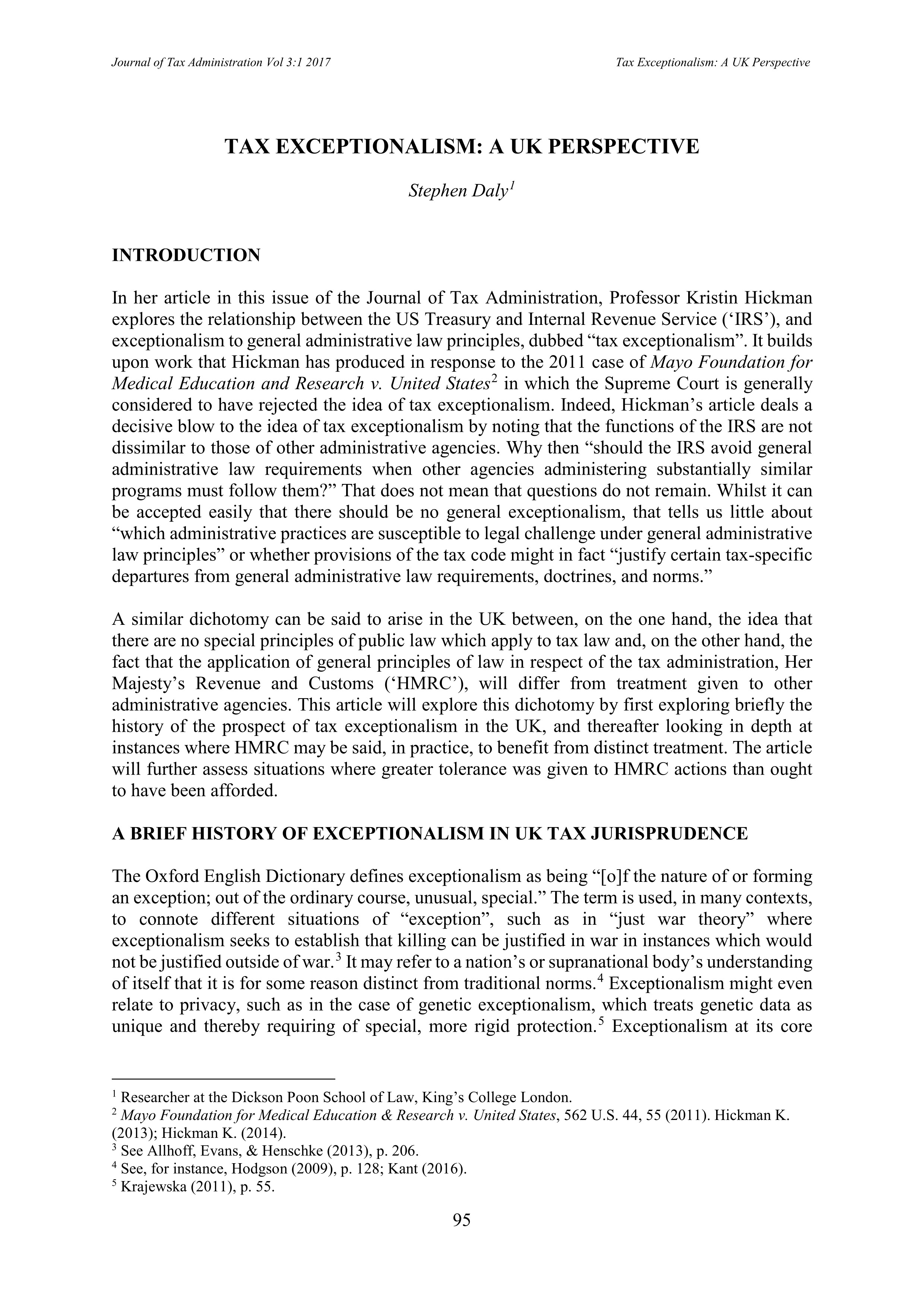Tax Exceptionalism: A UK Perspective
Abstract
In her article in this issue of the Journal of Tax Administration, Professor Kristin Hickman explores the relationship between the US Treasury and Internal Revenue Service (‘IRS’), and exceptionalism to general administrative law principles, dubbed “tax exceptionalism”. It builds upon work that Hickman has produced in response to the 2011 case of Mayo Foundation for Medical Education and Research v. United States in which the Supreme Court is generally considered to have rejected the idea of tax exceptionalism. Indeed, Hickman’s article deals a decisive blow to the idea of tax exceptionalism by noting that the functions of the IRS are not dissimilar to those of other administrative agencies. Why then “should the IRS avoid general administrative law requirements when other agencies administering substantially similar programs must follow them?” That does not mean that questions do not remain. Whilst it can be accepted easily that there should be no general exceptionalism, that tells us little about “which administrative practices are susceptible to legal challenge under general administrative law principles” or whether provisions of the tax code might in fact “justify certain tax-specific departures from general administrative law requirements, doctrines, and norms.”
A similar dichotomy can be said to arise in the UK between, on the one hand, the idea that there are no special principles of public law which apply to tax law and, on the other hand, the fact that the application of general principles of law in respect of the tax administration, Her Majesty’s Revenue and Customs (‘HMRC’), will differ from treatment given to other administrative agencies. This article will explore this dichotomy by first exploring briefly the history of the prospect of tax exceptionalism in the UK, and thereafter looking in depth at instances where HMRC may be said, in practice, to benefit from distinct treatment. The article will further assess situations where greater tolerance was given to HMRC actions than ought to have been afforded.
References
Allhoff F., Evans H. G., & Henschke A. (2013). Routledge Handbook of Ethics and War: Just War Theory in the 21st Century. London: Routledge.
Daly S. (2017). Public disclosures and HMRC’s duty of confidentiality: R (Ingenious Media) v HMRC. British Tax Review, 1, 10-21.
Hickman K. (2013). Unpacking the Force of Law. Vanderbilt Law Review, 66(2), 465-543.
Hickman K. (2014), Administering the tax system we have. Duke Law Journal, 63, 1717-1770.
HMRC (2011), Litigation and Settlement Strategy. Available at: http://www.hmrc.gov.uk/practitioners/lss.pdf [Accessed 13 April 2017].
Hodgson G. (2009). The Myth of American Exceptionalism. Yale: Yale University Press.
Kant I. (2016). European exceptionalism and the EU's accession to the ECHR. European Journal of International Law, 27(3), 565-589 (Comment).
King J. (2008). The Pervasiveness of Polycentricity. Public Law, 101-124.
Krajewska A. (2011). The right to personality in (post)-genomic medicine: a new way of thinking for the new frontier, European Human Rights Law Review, 1, 54-70.
Loutzenhiser G. (2016). Tiley’s Revenue Law, 8th edn. Oxford: Hart Publishing.
Mostrous A., Schlesinger F., & Watson R. (2012, 21 June). Screen play: how movie millions are moved offshore. The Times. Retrieved from https://www.thetimes.co.uk/article/screen-play-how-movie-millions-are-moved-offshore-gvld8tdqr92
National Audit Office. (2012). Settling large tax disputes.
Public Accounts Committee. (2011). HM revenue & customs 2010-11 Accounts: Tax disputes. HC 1531 (2010-12).
Schlesinger F. (2012, 21 June). World of glitz and glamour that’s on the Revenue’s radar. The Times. Retrieved from https://www.thetimes.co.uk/article/world-of-glitz-and-glamour-thats-on-the-revenues-radar-0kzpwpwshq5

Downloads
Published
How to Cite
Issue
Section
License
Copyright (c) 2017 Stephen Daly

This work is licensed under a Creative Commons Attribution 4.0 International License.
Our open access status means that authors retain the copyright of their work. However, all papers published in JOTA are done so under a Creative Commons Attribution 4.0 International license (CC BY). This means that others can share and/or adapt your work without your permission as long as they follow certain rules, including attributing your work correctly.
You can learn more about this on our Open Access, Licensing, and Copyright Policies page.



